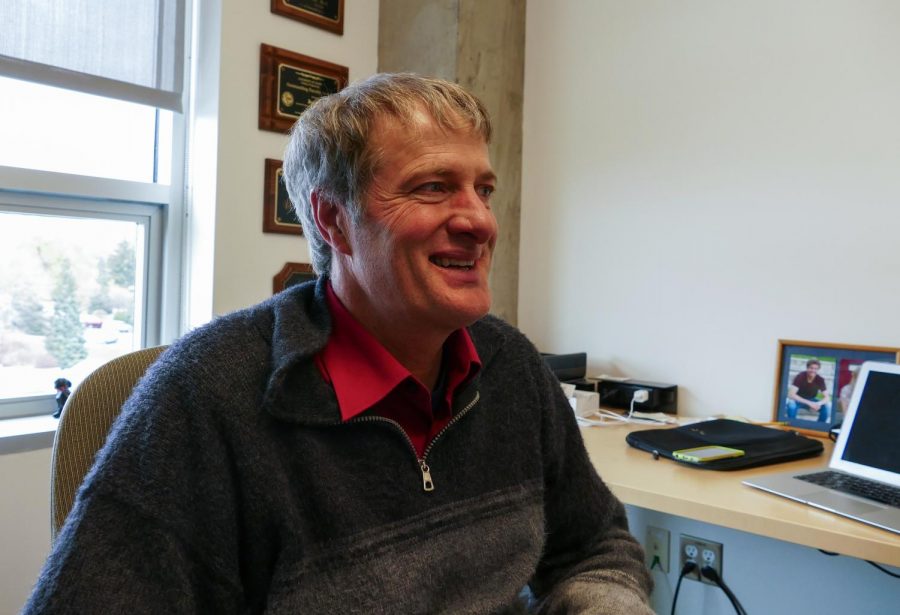We need to act on climate change
Planet’s shifting environment should not be taken lightly: as it currently stands, Earth is facing dark fate
STEPHEN MURNANE | THE DAILY EVERGREEN
Jan Boll, civil and environmental ngineering professor, talks about current and future environmental issues and what can be done to help Oct. 25 in the PACCAR Environmental Technology Building.
November 2, 2018
Despite what some individuals want you to believe, climate change and global warming are real. We are coming to a point in time where we cannot deny this reality any longer or we will irrevocably damage the planet we live on. The time to act both governmentally and individually is now.
Global warming and climate change seem like interchangeable terms, but they are not. Global warming is based on data that shows Earth’s average temperature is increasing, while climate change is the effect of the warming climate and what that means, said Jan Boll, professor of civil and environmental engineering at WSU.
Climate science and climate change were not discovered recently. In 1904, a Swedish scientist named Svante Arrhenius analyzed climate data and discovered a warming pattern that was not far off from models we have today, Boll said.
Guy Callendar, a steam engineer and meteorologist, confirmed this finding in 1938 with his paper, “The artificial production of carbon dioxide and its influence on temperature.” James Hansen, a scientist at NASA and now known to some as the “father of climate change awareness,” came to the same conclusion in 1988 when he spoke in front of a Congressional committee, according to The New York Times.
The U.N. Intergovernmental Panel on Climate Change released a special report on Oct. 8 warning that global warming would likely reach 1.5 degrees Celsius, or about 2.7 degrees Fahrenheit, between around 2030 and 2050. It warned that drastic measures need to be made by 2030 to avert a climate crisis.
A warming of 2.7 degrees Fahrenheit may not seem like a large increase, but the effects can be serious. We are already experiencing some of them such as larger, more frequent storms and higher annual temperatures, Boll said. For example, we could see more devastating hurricanes like Katrina, Sandy and Harvey.
In our region specifically, we would experience a warmer climate and more variable weather, Boll said. This could impact our agriculture and its economy. If, for example, we do not have snow in the mountains or have rain at the wrong time, we will not have the necessary amount of water required for our agricultural needs.
One issue our region and others like ours could see in the future, if we are not already experiencing it, is climate refugees, Boll said. A rise in sea level is expected to displace up to 13 million people along U.S. coastlines by the end of the century, according to National Geographic. Our region could experience an influx of people relocating from areas experiencing rises in sea level and devastation from storms.
It sounds like doom and gloom, and to a certain point it is, but we still have an opportunity to fix it.
“Do something that makes you feel that you are contributing in a positive way,” Boll said. “If you read too much of the news, it’s a disaster. At least do something about it and encourage others to do it, too.”
One way to fix this is to vote. Certain elected officials and political parties do not believe in climate change and refuse to act. Vote them out. Vote for candidates who will take this IPCC report seriously and do something to save our planet.
Another way is to make small, individual changes in the way we live. For example, we can reduce the amount of driving we do by walking to work or school. That saves us gas money, too. Little changes we can make in our product consumption and habits can make a big difference. Everyone making small changes makes an even bigger impact.
It can be easy to lose hope and feel anxious about this issue because a lot of this situation is not within our individual control. However, we should not worry about what we cannot control and should instead focus on the changes we can make that will have an impact.
“If you do not control something, you should not be worried about it,” Boll said. “If you cannot control the outcome, you should not be worried about it. You can still contribute to the best of your abilities.”






















